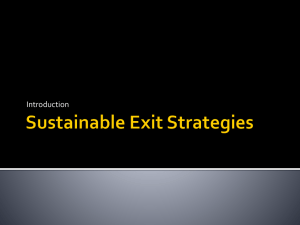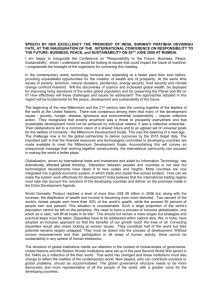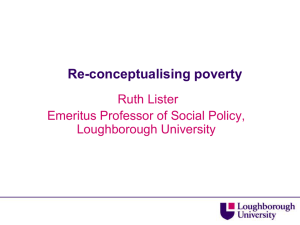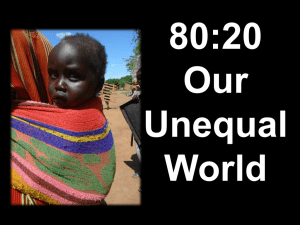THE ROAD OF DIGNITY Andres Gomez Polanco The United
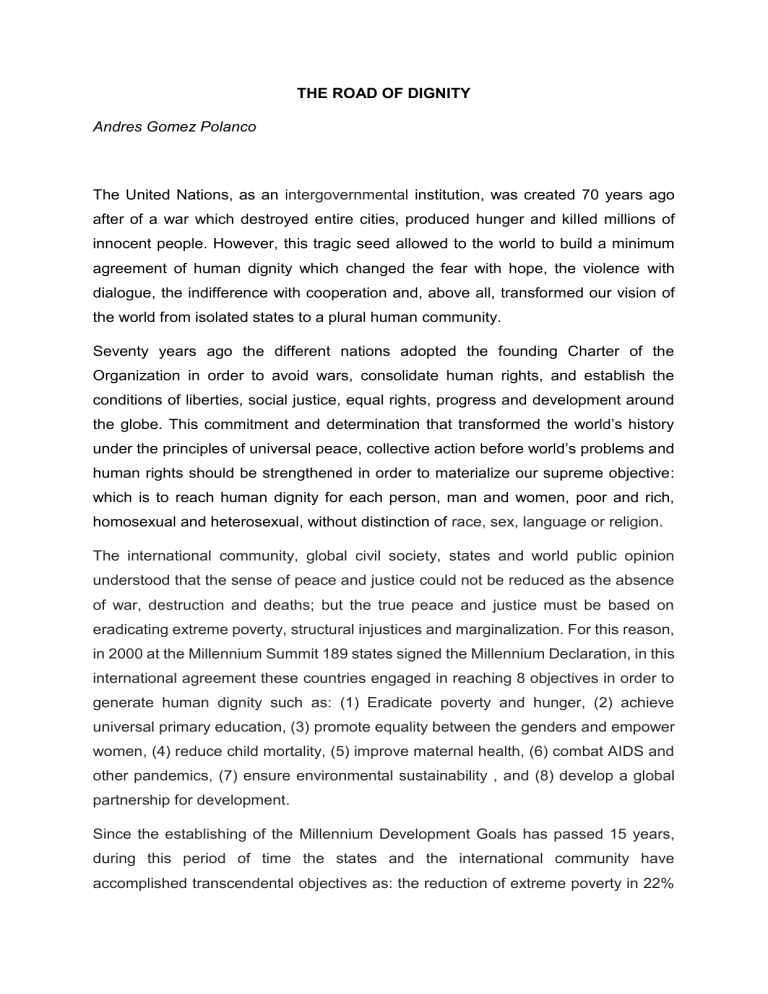
THE ROAD OF DIGNITY
Andres Gomez Polanco
The United Nations, as an intergovernmental institution, was created 70 years ago after of a war which destroyed entire cities, produced hunger and killed millions of innocent people. However, this tragic seed allowed to the world to build a minimum agreement of human dignity which changed the fear with hope, the violence with dialogue, the indifference with cooperation and, above all, transformed our vision of the world from isolated states to a plural human community.
Seventy years ago the different nations adopted the founding Charter of the
Organization in order to avoid wars, consolidate human rights, and establish the conditions of liberties, social justice, equal rights, progress and development around the globe. T his commitment and determination that transformed the world’s history under the principles of universal peace, collective action before world’s problems and human rights should be strengthened in order to materialize our supreme objective: which is to reach human dignity for each person, man and women, poor and rich, homosexual and heterosexual, without distinction of race, sex, language or religion.
The international community, global civil society, states and world public opinion understood that the sense of peace and justice could not be reduced as the absence of war, destruction and deaths; but the true peace and justice must be based on eradicating extreme poverty, structural injustices and marginalization. For this reason, in 2000 at the Millennium Summit 189 states signed the Millennium Declaration, in this international agreement these countries engaged in reaching 8 objectives in order to generate human dignity such as: (1) Eradicate poverty and hunger, (2) achieve universal primary education, (3) promote equality between the genders and empower women, (4) reduce child mortality, (5) improve maternal health, (6) combat AIDS and other pandemics, (7) ensure environmental sustainability , and (8) develop a global partnership for development.
Since the establishing of the Millennium Development Goals has passed 15 years, during this period of time the states and the international community have accomplished transcendental objectives as: the reduction of extreme poverty in 22%
around the globe, 3.3 million of deaths were avoided through the prevention of diseases such as tuberculosis and malaria. Furthermore, 2.3 billion of people have access to clean water and sanitation, in developing regions have been reduced disparities in primary education between boys and girls, and the political participation of women has systematically increased.
Undoubtedly, these objectives have been strategic instruments in order to make that universal peace will be the fruit of justice, but there are still huge challenges that deserve a new perspective to be solved because, today, more than a billion of human beings live in an extreme poverty around the world and the deepening of climate change and the destruction of the environment. Moreover, there are still a billion of people without access to clean water and sanitation, around the globe exist 35 million of people that have AIDS and not all receive the medical treatment. And, above all, the problem of inequalities and the concentration of wealth, due to the richest 1% of the world population owns almost half of the planet's wealth while the other half is divided between the remaining 99%.
Therefore, there must be a new global agenda for development post-2015 because it is necessary that states, United Nations, global civil society, business, and common citizens build new objectives in order to reach human dignity. These new goals should recognize and identify the new challenges, problems, realities and opportunities of this epoch to be truly effective and inclusive. Our responsibility is to be part of this global debate generating ideas, arguments, reasons and goals for the next generations, whereas this new objectives should focus in two structural aspects which are: cultural diversity and sustainability.
Following this logic, in the next paragraphs this essay will propose, analyze and explain seven development objectives in the framework of the global agenda post-
2015, which will be based on social and economic progress, social justice, democratization of technologies, environmental and energetic sustainability, human rights and cultural pluralism. Because now is the time when common citizens must participate and empower ourselves as part of the solutions before the present and future challenges, only in this form the spirit of peace, justice and development of 70 years of sacrifices, efforts and determination will endure.
Objective 1: EXTREME POVERTY AND HUNGER 0
The fight against extreme poverty requires a wide and deep commitment among states, business, international institutions, non-governmental organizations, regional blocs and civil society in order to reduce at least in a half the billon of people that still live in social marginalization for the year 2030. This goal to be materialized need the creation of opportunities of productive enterprise, recognizing the cultural and linguistic particularities of each region and country, especially in local and rural realities where extreme poverty is generally localized. In other words, the reduction of extreme poverty and hunger should combine the welfare perspective with a paradigm of productive empowerment, since in this way poor people will be able to be owners of their own destiny, emphasizing multicultural and sustainable development projects in rural areas.
Objective 2: GLOBAL COMMITMENT TO THE ENVIRONMENT
The climate change, deforestation, endangered animals, destruction of aquifers and the massive extraction of natural resources are not threats of the future, there are challenges of the present that affect entire societies and deteriorate de living conditions around the globe. For these reasons, the main commitment in order to save the planet, our home, is consolidate and legitimize the different international treaties in the subject. Especially, the Kioto Protocol on climate change establishing concrete goals for reductions in carbon dioxide emissions according to the level of development and cultural perspectives of each country. For example, it must be built an institutional international framework that figure out globally negative and positive tax incentives to reduce contamination and, above all, the inclusion of industrialized countries to this convention.
Objective 3: CLEAN ENERGY AS AN ALTERNATIVE OF DEVELOPMENT
The world has to change its paradigm of development that is exclusively based on consumerism and exploitation of fossil fuels to a new conception of alternative energies. In fact, this change ought to be a systematic and gradual process that replace the use of oil, natural gas and coal, in the main industries, for the use of wind energy, hydroelectric, geothermal, tidal energy, solar and wave energies, biomass and biofuels. For instance, states, multinationals and intergovernmental institutions must configure a strategy to mass produce vehicles that work throughout clean energy. And
this change of paradigm should recognize and include the experiences of multicultural ways of life in order to harmonize natural sustainability with cultural sustainability.
Objective 4: DEMOCRATIZATION OF TECHNOLOGY
The technology has to be considered as an instrument of political, economic, commercial, social, cultural and linguistic progress due to it must be democratized around the globe, particularly in the poorest geographical areas. Through this measure people of different cultures, with diverse manners and distinct views of life could interact easily in order to share ideas, increase commerce, to have access to knowledge and information, but, above all, cultivate tolerance, respect to others, understanding and learn to live in a plural global society. As a result of the democratization of technology people will see the differences not as an obstacle, whereas as an opportunity to work together to reach human dignity.
Objective 5: EQUITY FOR PROSPERITY
The global society cannot preserve and hold on the current unfair and asymmetric system of distribution of wealth, because in a world where a minority controls and usufructs the 50% of the wealth and a majority develops its lives with economic and social problems, the social cohesion, peace, political stability and legitimacy are in danger. In others words, this problem is not just about an ethical issue, it is a problem which is regard with efficient, inclusion and sustainability. Due to if the unfair redistribution of wealth is maintained, structural problems such as poverty, exclusion, economic stagnation, lack of human rights and multicultural violence will endure. In order to transform the inequalities in opportunities for all, especially for the poor people, in the long period of time states, regional blocs and international institutions should create a global tax system –in the financial world- for wealthy to canalize these resources to combat poverty. And in the short time the international community has to configure an international agreement with multinationals, states, and business to create a global framework that guarantee fair salaries, investments, jobs and entrepreneurships in the areas to the world with high levels of extreme poverty and inequalities.
Objective 6: EDUCATION AS A WAY OF SOCIAL MOBILITY
The world requires that the majority of the people have access to education, but beyond of elementary schools which are transcendental, the global economy and the development projects to eradicate poverty, inequalities, and build a sustainable progress need to democratize the access to technical and college education to millions of young people. This objective could be materialized through the creation of international educational framework where public and private schools, universities, colleges, elementary schools and any educational establishment will be able to integrate boys, girls and young people in poverty, regardless its nationality, to education. Throughout this action that must be financed by an international common fund; people with distinct languages, cultures, customs and traditions could interact systematically and learn each other in order to generate common ground between differences.
Objective 7: POLITICAL WILL THROUGH INSTITUTIONS
The objectives that have been set in this essay need the political will of states, intergovernmental institutions and business in order to transform our dreams in concrete actions. In addition, this political will does not depend exclusively on the good intentions of these actors because global civil society, young people, common citizens and different persons with diverse cultures, beliefs and ideologies can be part of these changes th rough their own participation. In other words, the viability of people’s influence to the power requires an institutional reform in United Nations to democratize, canalize and include people’s participation. In this form, these goals will be legitimized by open discussion citizen in which human dignity will be understood in any language and any culture.
Finally, this essay has had as purpose encourage the generation of ideas, solutions and goals in order to face the global challenges since an inclusive perspective that take in count two irreplaceable facts: the cultural diversity and the sustainability. So, as
70 years ago we have the duty to demonstrate that hope, justice and peace can overcome any challenge if human beings regardless their race, culture, origin, religion or sexual preference are together for human dignity.

